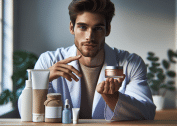Collagen skincare has become a lasting trend in wellness and beauty. Discover what drives the popularity of collagen creams, serums, and supplements, including the science, potential benefits, and what experts recommend. Explore ingredients, routines, and consumer concerns—all backed by trusted sources.
Understanding the Collagen Craze
Collagen is everywhere in beauty today. From supplement powders to topical serums, advertisements feature this powerhouse protein as a key to glowing skin. Collagen provides the structure that supports youthful, plump skin, but its production naturally decreases with age. As this decline happens, fine lines, sagging, and dullness may become more apparent. These changes have driven a surge in consumer interest, especially in collagen-boosting beauty treatments. Social media, celebrity endorsements, and dermatologist-backed advice have all contributed to the current surge in demand–and countless topical products now feature hydrolyzed collagen as a star ingredient.
But what’s really behind the science of collagen skincare? Not all collagen trends are equally effective, and consumer demand is prompting new research. Collagen molecules are too large to be absorbed deep into the skin, raising questions about how much benefit topical products can deliver. However, hydrolyzed collagen, which is broken down into smaller peptides, may be more readily absorbed, allowing it to support the skin barrier or reduce water loss. Many products also include vitamin C and peptides, both believed to assist the body in synthesizing collagen. Understanding which products actually deliver on their promises can help savvy consumers avoid hype and focus on options supported by evidence.
With so much competition, brands are innovating to differentiate their collagen offerings. This includes adding antioxidants, moisturizers, and other popular skincare ingredients. Some products focus on improving skin elasticity, while others highlight benefits for hydration or pigmentation. Even the concept of ‘clean’ or cruelty-free collagen is shaping today’s market. Ingredient lists and clinical studies are increasingly accessible for consumers to review. Assessing formulations and branding can provide clues about what’s trending and what might have staying power.
The Science Behind Collagen Supplements
Collagen supplements, especially powders and capsules, are one of the hottest beauty trends. They’re often marketed as a way to boost the body’s own collagen production and promote radiant skin. But how do collagen peptides work, and what does the data say? Research suggests that ingesting hydrolyzed collagen can stimulate fibroblasts, the cells responsible for collagen synthesis. This could enhance elasticity and hydration, with potential results building over several weeks to months. Still, not all supplements are created equal. Purity, peptide size, and co-ingredients, such as vitamin C or hyaluronic acid, can impact how effective a supplement might be.
Clinical studies show some encouraging results. Several randomized controlled trials have found that participants taking daily collagen supplements had improved skin elasticity, reduced wrinkles, and enhanced moisture compared to placebo groups. Benefits often depend on consistency and the specific formulation used. Some supplements include additional ingredients like biotin or zinc, believed to support skin structure and hair health. It’s also worth noting that not everyone responds the same way, as genetics, age, and lifestyle play a role in results. Experts recommend approaching supplements as one part of a broader skincare routine, not a magic fix.
Given the variety of collagen types (such as types I, II, and III), consumers should look for products suited to their desired benefits. Type I collagen, most abundant in skin, is commonly used in beauty supplements. Meanwhile, type II is found in cartilage and often promoted for joint health. Transparency around sourcing—marine, bovine, or plant-based collagens—also matters for those with dietary preferences. Reviewing product quality and certifications, such as third-party testing or sustainable sourcing labels, can offer peace of mind amid a crowded market.
Topical Collagen: Creams, Serums, and Masks
Topical collagen creams and serums promise to smooth, plump, and firm the skin’s outer layer. How do these products differ from supplements, and what do dermatologists think? While the collagen molecule itself is large, recent advances in skincare have led to hydrolyzed versions designed for better absorption. These forms, combined with supporting actives like peptides and antioxidants, can temporarily boost skin hydration or reduce the appearance of fine lines. Collagen masks and sheet masks deliver a quick burst of moisture, a favorite for instant glow before events.
Dermatologists often highlight accompanying ingredients as crucial to effectiveness. Many collagen-rich products feature vitamin C, retinol, hyaluronic acid, or niacinamide, each playing a role in supporting skin barrier repair or stimulating natural collagen production. Peptides, short chains of amino acids, are another trendy addition, signaling skin to produce more collagen and elastin. Consumers seeking noticeable improvement may look for multi-ingredient formulas tailored to aging or dry skin. Ingredient transparency and third-party testing have become important as more people want to know exactly what’s inside the jar.
It’s also important to manage expectations. Most experts agree topical collagen offers temporary benefits compared to internal collagen production. Using products as part of a holistic regimen—combined with sun protection, gentle cleansing, regular exfoliation, and balanced nutrition—may provide the most visible results. When trying a new serum or face mask, patch testing is always advised to check for side effects. Over time, consistent care can help maintain elasticity and radiance for skin of all types and ages.
Integrating Collagen Into a Skincare Routine
Building an effective collagen skincare routine involves more than picking the most popular product. Timing and layering matter. Many people start with a collagen serum after cleansing and before moisturizing, as this allows key peptides and hydrators to penetrate. Collagen creams are often used as a final step to lock in moisture overnight or prep skin before makeup. For those taking oral supplements, consistency is key—research suggests several weeks of daily use may be needed for visible improvement in texture or elasticity.
Integrating additional supporting ingredients can make routines more comprehensive. Vitamin C serums work in tandem with collagen to support the skin’s antioxidant defenses and improve brightness. Sunscreen is always non-negotiable, as UV exposure accelerates collagen breakdown. Lifestyle choices also matter; staying hydrated, eating a balanced diet rich in amino acids, and managing stress can all support healthy skin structure. Experts suggest avoiding trends that seem too good to be true and instead focusing on scientifically supported options.
Individuals with specific skincare needs—such as sensitive, acne-prone, or mature skin—should tailor collagen products accordingly. Some creams and serums are designed to address pigmentation, redness, or moisture loss, allowing for a more customized approach. Consulting with a dermatologist or aesthetician, reading ingredient lists, and starting new products one at a time can help reduce the risk of irritation while maximizing potential benefits. Over time, a consistent, personalized routine often yields more sustainable improvement than any single miracle product.
What to Know About Collagen Quality and Safety
With so many collagen products on the market, concerns about quality, safety, and efficacy are common. Not all products deliver what they promise, and ingredient sourcing, purity standards, or potential allergens should be checked. Some people prefer marine collagen for its smaller peptide size, while others opt for grass-fed bovine sources. Plant-based alternatives use amino acid blends to mimic the skin-supporting effects of animal-derived collagen. Checking for certifications, independent lab testing, and allergen disclosures is wise before starting any new supplement or cream.
Adverse reactions to topical collagen are rare but can include irritation or breakouts in sensitive individuals. Reading labels for potential allergens and patch testing new products on a small area can help prevent unwanted side effects. For oral supplements, mild digestive issues have been reported in some users. Always follow product instructions and consult a healthcare professional if unsure, especially for those with existing health conditions, allergies, or dietary restrictions. Reliable brands clearly state sourcing, composition, and intended use on packaging and websites.
Regulation of collagen supplements varies by country, so it’s especially important to purchase from reputable sources. Look for brands with transparent sourcing and third-party testing. The decision to use collagen, whether through skincare or supplements, should consider individual needs and preferences. With informed choices, many people find collagen to be a beneficial addition to a wellness routine. Satisfaction often depends on realistic expectations and a holistic view of skin health.
Future Directions in Collagen and Beauty Technology
The future of collagen in wellness and beauty looks promising, thanks to ongoing innovation. Biotech companies are creating lab-grown collagen to support vegan and environmentally-conscious consumers. Advances in peptide chemistry, time-release delivery systems, and microencapsulation techniques are helping ingredients reach deeper layers of skin for longer-lasting effects. Hybrid products that combine collagen with probiotics, adaptogens, or botanical extracts hint at new ways to approach holistic skincare.
Personalization will likely become more important as biotechnology develops. Companies are investing in data-driven approaches—using genetic, lifestyle, or skin biome data—to recommend the most effective collagen products. Smart packaging, digital apps, and user-tailored routines are on the horizon. In the meantime, expert consensus suggests that every new treatment or supplement should be assessed for independent testing and consumer transparency, especially as the market rapidly evolves.
Staying informed and critically evaluating new trends is key. Responsible use of collagen, grounded in science and expert guidance, can yield individual benefits within a thoughtful routine. By tracking advances and choosing carefully, individuals can navigate collagen’s evolving world and enjoy the skin-supporting results they seek. Wellness and beauty are deeply personal, and the future will offer even more ways to support both.
References
1. Harvard Health Publishing. (2022). Collagen supplements: Do they work? Retrieved from https://www.health.harvard.edu/blog/collagen-supplements-do-they-work-202108232564
2. American Academy of Dermatology Association. (2023). Collagen creams: Can they replace lost collagen? Retrieved from https://www.aad.org/public/everyday-care/skin-care-basics/collagen
3. Cleveland Clinic. (2022). Collagen and skin health: What the research says. Retrieved from https://health.clevelandclinic.org/collagen-for-your-skin/
4. U.S. Food and Drug Administration. (2021). Dietary Supplements. Retrieved from https://www.fda.gov/food/dietary-supplements
5. National Institutes of Health. (2021). Collagen and health: What you need to know. Retrieved from https://ods.od.nih.gov/factsheets/Collagen-Consumer/
6. Mayo Clinic. (2023). Skin care: Collagen and other anti-aging ingredients. Retrieved from https://www.mayoclinic.org/healthy-lifestyle/adult-health/expert-answers/anti-aging/faq-20057959









